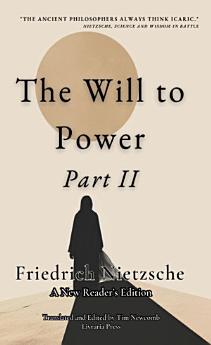The Will to Power: Part II: A New Reader's Edition
May 2024 · The Collected Works of Friedrich Nietzsche Book 34 · Marchen Press
Ebook
363
Pages
family_home
Eligible
info
reportRatings and reviews aren’t verified Learn More
About this ebook
"Der Wille zur Macht" (The Will to Power) is a posthumously published collection of Nietzsche's notes and unpublished writings, organized by his sister Elisabeth Förster-Nietzsche. Although Nietzsche did compile the notes and drafts titled "The Will to Power", it was not published during his lifetime. Instead, it was posthumously edited and published by his sister, Elisabeth Förster-Nietzsche, and Peter Gast in 1901. Due to the enormous size of the document, this was published in two different parts. The book is often considered controversial due to questions about its editing and compilation by his sister and the team of Academics who first published it. However, it contains important insights into Nietzsche's evolving thoughts on power, creativity, and the nature of reality. The concept of the will to power is central to Nietzsche's philosophy and is found in nearly every single one of his works, major and minor. The Will-to-Power (Wille-zur-Macht) is a kind of "Life force" similar to the Logos of Heraclitus mentioned in the New Testament, and the Leibnizian Via Viva used in the Physics of the day. This is the driving force behind all human action and the desire for self-overcoming, a re-formulation of Schopenhauer's Will-to-Live (Wille-zum-Leben). The term Will-to-Power, presented more fully in his notebooks from about 1885 and found informally in his childhood essays, embodies a multifaceted interpretation of power that includes the affirmation of eternal cycles of life and death and the assertion of individual autonomy in shaping one's interpretation of existence. This will is intertwined with the interpretation of life, where the ability to integrate even the most horrific experiences leads to "tragic greatness" and the acceptance, even embrace, of fate. The "will to power" becomes the means to autonomy, "liberating" the individual through the freedom gained from integrated life interpretations including "right" and "wrong". Nietzsche's idea has inspired various interpretations, ranging from Heidegger's metaphysical inquiry to Foucault's discourse theory, while contemporary perspectives tend to see it as less central to Nietzschean philosophy, emphasizing its critical function against fixed truths and its role in shaping interpretive processes rather than as a static state of power. This modern critical reader's edition offers a clear and accessible translation of Nietzsche’s original manuscript, using contemporary language and streamlined sentence structures to make his complex ideas easier to engage with. Designed for both general readers and students of philosophy, the edition includes a range of supporting materials to provide context and deepen understanding. These include an afterword by the translator discussing the historical reception and intellectual legacy of the work, an index of key philosophical concepts with emphasis on Existentialism and Phenomenology, a chronological list of Nietzsche’s published works, and a detailed timeline of his life, highlighting the personal relationships that influenced his thinking.
About the author
Friedrich Nietzsche (1844-1900) was a watershed German philosopher, cultural critic, poet, musician (briefly) and philologist (the study of ancient manuscripts) whose work has had a profound impact on modern intellectual history. Known for his critiques of European morality and religion (particularly Protestantism), Nietzsche's ideas on the "will to power" and the "Übermensch" have influenced a wide range of philosophical, literary, and psychological thought including thinkers such as Martin Heidegger, Albert Camus, Michael Foucault and the entire Postmodern religion.
Rate this ebook
Tell us what you think.
Reading information
Smartphones and tablets
Install the Google Play Books app for Android and iPad/iPhone. It syncs automatically with your account and allows you to read online or offline wherever you are.
Laptops and computers
You can listen to audiobooks purchased on Google Play using your computer's web browser.
eReaders and other devices
To read on e-ink devices like Kobo eReaders, you'll need to download a file and transfer it to your device. Follow the detailed Help Center instructions to transfer the files to supported eReaders.











